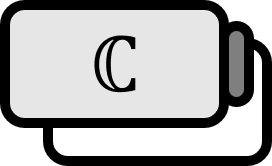The Relationship Between the Powers of i and the Powers of e
Theorem
Natural constant $e$ and imaginary number $i$ raised to a power satisfy the following relationship.
$$ e^{i\frac{l \pi}{2}} = i^{l} $$
Proof
Since $e^{ i \frac{l \pi}{2}}=\cos\frac{l \pi}{2}+i\sin \frac{l \pi}{2}$, when $l=0$,
$$ e^{ 0}= 1 =i^{0} $$
When $l=1$,
$$ e^{ i \frac{\pi}{2}}=\cos\frac{\pi}{2}+i\sin \frac{\pi}{2}=i=i^{1} $$
When $l=2$,
$$ e^{ i \pi}=\cos \pi+i\sin \pi=-1=i^{2} $$
When $l=3$,
$$ e^{ i \frac{3\pi}{2}}=\cos\frac{3\pi}{2}+i\sin \frac{3\pi}{2}=-i=i^{3} $$
As it repeats thereafter,
$$ e^{ i \frac{l \pi}{2}}=i^l $$
■
